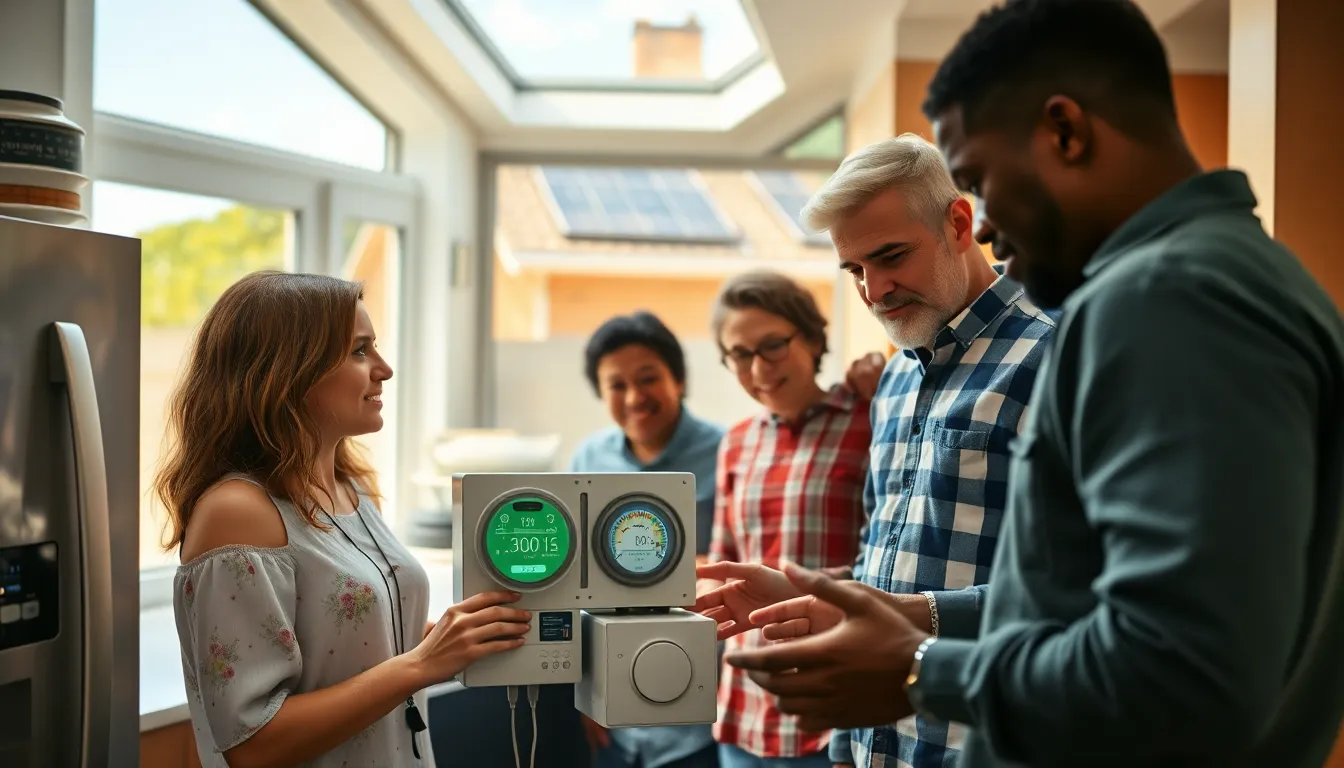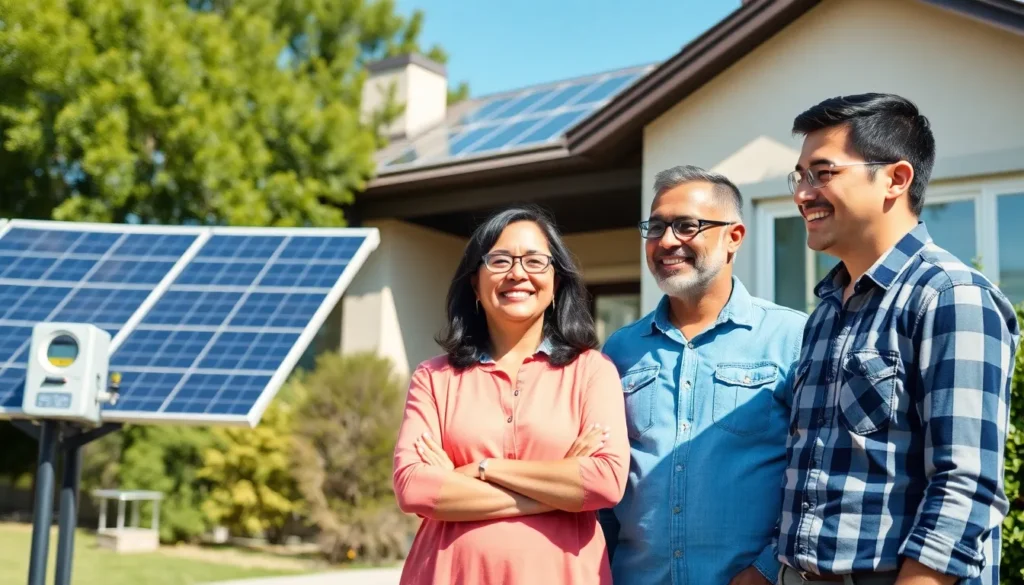In a world where energy bills can feel like a bad joke, smart energy solutions are the punchline everyone’s been waiting for. These innovative technologies not only help save money but also make the planet a happier place. Imagine slashing your energy costs while impressing your friends with your eco-friendly prowess—now that’s a win-win!
Table of Contents
ToggleOverview of Smart Energy Solutions
Smart energy solutions utilize advanced technology to enhance energy efficiency and optimize consumption. These solutions range from smart meters to renewable energy sources and energy management systems. They facilitate real-time monitoring of energy usage, enabling users to make informed decisions.
Monitoring systems gather data about energy consumption patterns. This data enables identification of inefficiencies, allowing for targeted improvements. Smart appliances help in reducing energy usage by operating during off-peak hours, which lowers costs while minimizing strain on the grid.
Integrating renewable energy sources, such as solar panels and wind turbines, benefits both the environment and consumers’ wallets. These technologies allow users to generate their own electricity, reducing reliance on fossil fuels and decreasing greenhouse gas emissions.
Energy storage solutions play a crucial role in maximizing the benefits of renewable sources. Batteries store excess energy generated during peak production times, making it available for use when demand is high. This not only contributes to grid reliability but also helps individuals save on their energy bills.
Smart energy solutions promote sustainability and enhance property value. Installing these systems often leads to lower utility expenses and increased home efficiency. Customers appreciate the long-term savings and the positive impact on the environment, making smart energy solutions a worthwhile investment.
Benefits of Smart Energy Solutions

Smart energy solutions offer significant advantages for both consumers and the environment. They promote financial savings while improving ecological footprints.
Cost Efficiency
Cost efficiency stands as a primary benefit of smart energy solutions. Smart meters enable users to monitor real-time energy consumption, identifying peak usage hours. Users can adjust their habits and lower costs by shifting energy use to off-peak times. Studies indicate that households can reduce their energy bills by up to 20% using these technologies. Smart appliances also contribute by optimizing energy usage, further cutting down expenses. Moreover, integrating renewable energy sources leads to decreased reliance on grid power, enhancing overall savings.
Environmental Impact
The environmental impact of smart energy solutions significantly benefits sustainability efforts. Utilizing renewable sources, such as solar panels, reduces carbon footprints and fossil fuel dependence. Data shows that residential solar energy adoption can lower greenhouse gas emissions by hundreds of tons over its lifetime. Energy storage systems, like batteries, support grid resilience by capturing and storing excess energy. Users play a crucial role in promoting cleaner energy by minimizing waste and maximizing efficiency. These solutions ultimately lead to a healthier planet and contribute to global sustainability goals.
Types of Smart Energy Solutions
Smart energy solutions encompass various technologies that enhance energy efficiency and sustainability. They cater to both residential and commercial needs, providing innovative ways to manage energy consumption.
Smart Grids
Smart grids utilize digital technology to improve the reliability and efficiency of electricity distribution. They facilitate real-time data communication between consumers and energy providers. By enabling two-way communication, smart grids allow for better demand response strategies. They optimize electricity flows, reducing peak demands and preventing outages. Ultimately, smart grids encourage integration of renewable energy and support electric vehicle charging, making them essential for modern energy systems.
Renewable Energy Technologies
Renewable energy technologies harness natural resources, such as sunlight and wind, to generate electricity. Solar panels convert sunlight into usable energy, while wind turbines capture wind power. An increasing number of households now utilize solar energy systems, leading to reduced reliance on fossil fuels. These technologies not only decrease greenhouse gas emissions but also lower energy costs in the long term. Adoption of renewable energy boosts energy independence and offers significant environmental benefits.
Energy Storage Systems
Energy storage systems store excess energy for later use, enhancing efficiency and reliability. Batteries play a crucial role in managing energy generated from renewable sources. By storing energy during low demand and releasing it during high demand, they balance the energy supply. This capability improves grid stability while reducing costs for consumers. As energy storage technology advances, it becomes more cost-effective and integral to energy management strategies.
Challenges in Implementing Smart Energy Solutions
Implementing smart energy solutions presents several challenges that require attention. These obstacles range from technical barriers to policy and regulatory issues.
Technical Barriers
Technical barriers significantly hinder the adoption of smart energy solutions. Insufficient infrastructure affects the deployment of advanced technologies necessary for smart meters and energy management systems. Complexity in system integration creates challenges, as existing energy grids may not effectively accommodate new technologies. Additionally, data privacy concerns deter users from adopting solutions that rely on real-time monitoring. Cybersecurity risks further complicate implementation, as systems must protect sensitive information against potential attacks. These factors collectively impact the overall effectiveness of smart energy solutions.
Policy and Regulatory Issues
Policy and regulatory issues pose significant challenges for smart energy solution implementation. Inconsistent regulations across regions create confusion for consumers and providers alike, complicating energy management efforts. Lack of clear guidelines on the integration of renewable energy sources can stall progress, hindering the transition to greener alternatives. Incentives for adopting smart technologies often vary, affecting financial support for consumers. Moreover, outdated policies may not accommodate emerging technologies, thereby slowing innovation and deployment. Addressing these regulatory challenges fosters a more favorable environment for smart energy solutions.
Future of Smart Energy Solutions
Innovative developments in smart energy solutions shape the future of energy management. Technologies like artificial intelligence enhance the efficiency of energy systems, allowing for intelligent load management. Increased adoption of smart meters enables users to gather real-time data, empowering them to optimize their energy consumption.
Smart grids represent a significant advancement, facilitating two-way communication between consumers and energy providers. These systems support the advancement of renewable energy technologies. As solar and wind energy becomes more mainstream, reliance on fossil fuels decreases sharply.
Energy storage solutions are vital to the future landscape. By storing excess energy from renewable sources, batteries ensure steady energy availability even during peak demand. Integration of these solutions bolsters grid resilience and enables consumers to reduce their energy expenses further.
Regulatory frameworks must evolve alongside these technologies. Consistent policies encourage investment in smart energy solutions and simplify integration processes. Increased collaboration between governments and private sectors will drive innovation and enhance user experience.
Investment in research and development plays a critical role in advancing smart energy solutions. Stakeholders must prioritize funds toward improving energy efficiency and reducing costs. The focus on sustainable practices leads to healthier communities and a more robust economy.
As smart technology advances, the need for cybersecurity becomes more pressing. Ensuring robust security measures protects users and builds trust in smart energy systems. Consequently, comprehensive strategies will become necessary to mitigate risks associated with data privacy and security.
Future trends also indicate a rise in electric vehicle integration with smart energy solutions. This trend may lead to more efficient transportation, reducing urban pollution. Overall, the combination of these elements fosters a smarter, greener energy landscape that benefits consumers and the environment alike.
Smart energy solutions represent a transformative shift in how energy is consumed and managed. By enhancing efficiency and promoting sustainability they not only lower costs but also support a healthier planet. As technology advances the integration of renewable sources and smart grids will become increasingly vital.
The future lies in continued innovation collaboration and investment in smart energy technologies. Addressing existing challenges will pave the way for wider adoption ensuring that consumers can enjoy the benefits of reduced energy bills and a more sustainable lifestyle. Embracing these solutions is not just a smart choice but a necessary step towards a greener future.

